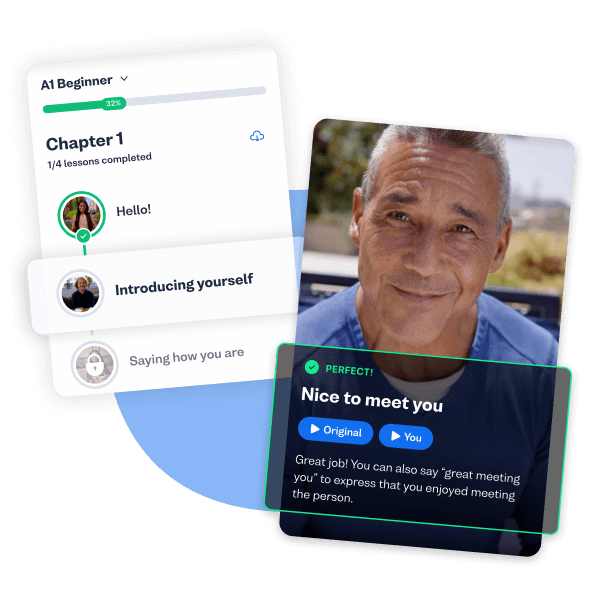I want to learn...
You’re learning a new language, and you want to speak like a local with locals. You can’t wait to be fluent. But what is fluency and how can you achieve it? Let’s take a look at the best ways to increase your fluency.
What is language fluency?
Language fluency is being able to effectively communicate in a language. Many people use the word fluent to describe someone who speaks well. But you can be a fluent reader, listener, or writer too.
The problem with talking about language fluency is that it’s pretty vague. What does it mean to effectively communicate in a language? You could use the CEFR levels to assess your fluency. And you could choose a level on the CEFR — C1 for example — but it’s kind of arbitrary.
That’s because being fluent can mean different things to different people. For example, let’s say you use French at work. You never need to speak French but you do need to email in French often. Fluency for you requires reading and writing. But no listening and speaking.
For most people, however, fluency means being comfortable speaking, reading, writing, and listening. But how proficient you need to be is dependent on your goals. If you want language for travel the level of fluency and difficulty is going to be much lower than someone who’s using language for diplomacy.
Remember, don’t confuse fluency with perfection. Fluency doesn't mean perfection. There are natural hesitations and pauses that native speakers make. You can be fluent and still make mistakes.
Do you need to be fluent to communicate?
Not really. You might raise your eyebrows at this, but hear me out. Anyone at any level can communicate. Non-fluent communication won’t be pretty but it can still be effective. Lots of pointing and waving, but it works. And worrying too much about fluency and accuracy can get in the way of communication.
How to become fluent
All language learners want to know how to become fluent. It’s a challenge but anyone can do it. Here are some tips to help you.
1. Set goals
You need a plan. Don’t learn blindfolded. One way to do this is by setting goals. Goal setting is proven to help second language learning achievement. In one study of almost two thousand Spanish learners - results showed a correlation between experience with goal setting and achievement.
Setting goals sounds easy but there are some things you need to be aware of. Follow the SMART goals framework to give yourself a good chance of success.
Your goals should be:
Specific
Measurable
Achievable
Relevant
Time-bound
An example SMART goal for language learners would be achieving B1 level French in one year. If you follow this framework, you set yourself up for success in learning your new language.
2. Immerse yourself
Language immersion programs are the most effective way to teach a language. And the immersion you get from spending time overseas leads to acquisition (obviously). But not everyone is lucky enough to go to an immersion school or live overseas.
For most people, you need to find ways to immerse yourself. The internet and globalization make that easier than ever.
Here’s how you can immerse yourself:
Listen to, read, and watch as much content as possible.
Spend time visiting countries or among immigrant communities in your home country.
3. Consume content
One benefit of immersion is the amount of input you get. The input hypothesis states input is the most important factor when learning a language. In fact, it says it’s all you need (but this is a controversial view). Despite the controversy, there’s no doubt the input you get from reading and listening is critical.
Everyone knows that if you want to improve your listening and reading skills, you need to listen and read. A lot. And that reading and listening are the best ways to learn vocabulary. So dust off those graded readers or make the most of Netflix to get some all-important input.
But there are some more surprising benefits to consuming content in your new language too. For example, research shows that focused listening is just as effective for improving pronunciation as joining a pronunciation class. Other research says that narrow listening — the repeated listening of native speakers discussing familiar topics — has tons of benefits for pronunciation and fluency too.
Worth noting: Reading a lot also indirectly improves your speaking and communication skills which seems counterintuitive because you’ve all heard that practice makes perfect and that speaking a lot is the best way to improve your speaking skills. Well, if you don’t have a chance to practice speaking, reading is good too.
4. Speak from day one
When people say they want to be fluent in a language they often mean they want to speak well: Many language learners think speaking is the most important skill. It can also be the hardest to practice when you're not in an immersion environment. That’s because finding the opportunity isn’t easy. Unless you’re lucky enough to have a friend, family member, or co-worker who speaks your new language, you need to put in a little more effort.
Let’s look at some examples of what you can do to practice speaking straight away. First, you could find a language buddy. A native speaker for language exchange would be ideal. But another language learner like you can also be a big help. Grab a coffee or a bite to eat and get chatting.
This next one might sound crazy, but it isn’t. You can talk to yourself. Common advice for language learners is to think in their new language. Well, talking to yourself — or private speech if you want to use the academic word — is closely related to thinking in a new language. Private speech can lead to the internalization of your new language. It won’t be as fun as chatting with a friend (and you might get some funny looks if you’re doing it out on the street) but it can help.
5. Practice a new language with Busuu
Finally, one of the best ways to practice a new language is with Busuu. There are 14 languages for you to choose from including the most useful languages in the world like English, Spanish, and Mandarin Chinese. You can practice pronunciation and get feedback from native speakers right on your mobile device. You can access courses made by language-learning experts and practice whenever and wherever you like.
AUTHOR

Barney Meekin
Newlanguages


